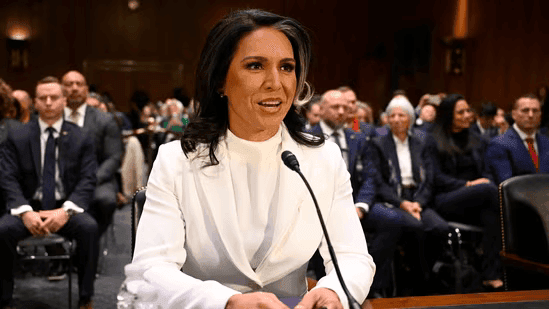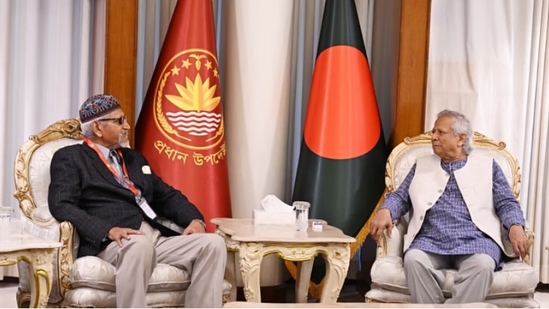In a move that has both stirred controversy and garnered support, Tulsi Gabbard, the former congresswoman from Hawaii and presidential candidate, is now on the cusp of leading the United States intelligence community.
On February 5, 2025, the Senate Intelligence Committee approved Gabbard’s nomination to head the Office of the Director of National Intelligence (ODNI), a role responsible for overseeing the U.S. intelligence agencies, including the CIA, FBI, and NSA. With this step, Gabbard is one step closer to potentially making history as the first woman, first Pacific Islander American, and first Hindu American to hold the position.
However, the question remains: Will her leadership serve as the power shift needed for U.S. intelligence to evolve, or will it become a reflection of the deeply divided political climate that continues to dominate Washington?
This article will explore the seven key factors that could determine whether Gabbard’s leadership will bring a much-needed power shift to the intelligence agencies or whether it will be just another chapter in the turbulent saga of American political polarization. As her confirmation hearings and subsequent leadership shape the future of U.S. intelligence, the world is watching closely to understand the lasting effects Gabbard may have on American espionage, security, and foreign policy.
1. Tulsi Gabbard’s Political Identity: A Bridge or a Divider?
One of the most intriguing aspects of Tulsi Gabbard’s career has been her ability to bridge various political divides, or, at times, fuel them. Gabbard, a former Democratic representative, turned independent, and later joined the Republican Party, has always been a figure who defies easy categorization. While she has been embraced by conservative circles due to her military service and strong stances on foreign policy, her policies and rhetoric often contradict traditional party lines.
Her rise to national attention began with her opposition to U.S. military interventions abroad. As a combat veteran, Gabbard’s anti-war stances, particularly on issues involving Syria and Russia, have earned her both fierce supporters and vehement critics. Supporters view her as a champion of peace and a voice for a more restrained foreign policy, while detractors argue that her views undermine U.S. security interests, especially in relation to countries like Russia, which has been accused of meddling in global affairs.
Her complex political identity could either be an asset or a liability in leading U.S. intelligence agencies. Will her ability to navigate between multiple political spheres allow her to unify a divided intelligence community, or will it further polarize an already fragmented system? The way Gabbard manages her political identity while leading U.S. intelligence could significantly impact her success in this role.
2. Her Military Background: Will Tulsi Gabbard Bring New Perspectives to the Intelligence Community?
As a former U.S. Army National Guard officer, Tulsi Gabbard has had firsthand experience with military operations. Her service in Iraq as a combat medic and her subsequent work in the Army Reserve gives her a unique perspective on the workings of national security. Unlike most of her predecessors in the role of DNI, Tulsi Gabbard’s direct military experience might provide her with a more grounded understanding of the realities facing American soldiers and intelligence agents in the field.
However, this military experience could be both a strength and a potential conflict of interest. Tulsi Gabbard’s alignment with certain military and defense contractors might raise concerns regarding her ability to separate personal experience from her policy decisions. The intelligence community has often struggled with over-reliance on military intelligence, and Tulsi Gabbard’s influence could either shift the community’s focus towards more nuanced intelligence gathering or reinforce the military-centric approach that has been a hallmark of recent U.S. security strategies.
Furthermore, Tulsi Gabbard’s military background might also shape her stance on domestic intelligence issues. The delicate balance between national security and civil liberties has always been a point of contention in American intelligence. Tulsi Gabbard’s track record of advocating for greater transparency and her skepticism toward government overreach might prompt her to push for reforms aimed at protecting citizens’ rights, while still ensuring U.S. intelligence agencies can operate effectively.
3. A History of Intelligence Reform: Will Tulsi Gabbard’s Leadership Mean Change for the Intelligence Community?
Throughout her political career, Tulsi Gabbard has been a vocal advocate for intelligence reform, particularly in how U.S. agencies handle surveillance and data collection. Her support for whistleblowers like Edward Snowden and her stance against surveillance programs run by the NSA have positioned her as an outsider in the intelligence community. This may be both a boon and a challenge for her leadership as she heads toward confirmation.
If confirmed, Tulsi Gabbard could implement long-overdue reforms within the U.S. intelligence system, including pushing for better oversight, greater transparency, and stricter regulations regarding data collection. Intelligence reform has long been a bipartisan issue, but whether Tulsi Gabbard can gather the political support needed for sweeping changes remains uncertain. Reforming the intelligence community is no easy task, especially when the agencies involved often operate with a great deal of secrecy and autonomy.
While Tulsi Gabbard’s vocal calls for change and her previous stances on whistleblower protections and privacy rights suggest a potential for reform, these same positions may put her at odds with intelligence professionals who favor a more traditional approach to national security. Her ability to balance the desire for reform with the operational needs of the intelligence agencies will be a key test of her leadership.
4. Relationship with Allies: Will Tulsi Gabbard’s Foreign Policy Views Shape U.S. Alliances?
Another critical factor in Tulsi Gabbard’s potential leadership is how her foreign policy views will shape the United States’ relationship with its allies, particularly in the intelligence-sharing realm. Tulsi Gabbard’s controversial stances on foreign policy, especially regarding Russia, Syria, and Iran, could lead to significant shifts in how the U.S. interacts with its global partners.
Her willingness to engage with adversaries like Russia, whom she has defended in the past, might alienate key NATO allies, especially those who view Russia as a significant threat. However, her advocacy for a less interventionist foreign policy could also lead to a reevaluation of U.S. intelligence priorities, possibly allowing for greater cooperation with countries that share her views on limiting military engagement.
The future of U.S. alliances may also depend on how Tulsi Gabbard handles the delicate issue of intelligence-sharing with countries that have differing political ideologies. The current climate of distrust between the U.S. and many of its traditional allies, due to the political turbulence of the past decade, may challenge Tulsi Gabbard’s efforts to forge new partnerships or restore old ones.
Tulsi Gabbard’s relationship with these countries will be crucial in maintaining the credibility of U.S. intelligence in global affairs. Her leadership style, which could either emphasize diplomacy or more aggressive approaches, will directly impact these alliances and the effectiveness of the intelligence community as a whole.
5. Public Perception: How Will Tulsi Gabbard’s Controversial Past Impact Her Leadership?
Tulsi Gabbard’s controversial past, particularly her comments on Syria and her ties to groups with questionable stances, has been a point of contention throughout her political career. Her critics have often accused her of being too sympathetic to authoritarian regimes, particularly in the Middle East. While her supporters argue that she’s a pragmatist who values peace over military intervention, this has caused significant backlash among both political elites and the intelligence community.
Her critics may argue that her controversial stances could hinder her ability to lead the intelligence community effectively, especially in regions where the U.S. has vested interests. If Tulsi Gabbard is confirmed, the intelligence community will likely have to address any lingering distrust or skepticism about her ability to separate personal ideology from national security priorities. This public perception will be one of the most significant obstacles Tulsi Gabbard will have to overcome in her new role.
6. The Role of Women and Minorities in Intelligence: Can Tulsi Gabbard Serve as a Trailblazer?
As the first woman, first Pacific Islander American, and first Hindu American nominated for the position of DNI, Tulsi Gabbard’s potential confirmation represents a significant milestone for both women and minorities in the intelligence community. While the intelligence community has seen more diversity in recent years, leadership positions, especially at the highest levels, have remained overwhelmingly male and white.
Tulsi Gabbard’s confirmation would be a historic step in breaking these barriers, sending a powerful message to women and minority groups that they too can lead in fields traditionally dominated by men. It also offers the opportunity to further diversify the perspectives and approaches within the intelligence community, which may lead to more inclusive and innovative strategies for addressing national security threats.
However, Tulsi Gabbard’s historic candidacy also raises questions about tokenism and whether her appointment would truly reflect a change in how the intelligence community operates, or whether it’s just a symbolic gesture. The question remains: will Gabbard’s leadership be more than just a milestone for women and minorities in government, or will it represent a genuine shift in how the U.S. approaches national security?
7. The Impact on National Security: Will Gabbard’s Leadership Strengthen or Weaken U.S. Intelligence?
At the heart of the debate lies the question of whether Gabbard’s leadership will strengthen or weaken U.S. intelligence. Her critics argue that her unorthodox foreign policy views and her past actions undermine the effectiveness of U.S. national security. Others believe that her outsider status could lead to the kind of reform and change that the intelligence community needs to be more effective in the modern world.
The answer to this question may depend on how well Gabbard can balance reform with national security concerns, bringing fresh perspectives while maintaining the high standards of security that the U.S. intelligence agencies are known for. Will Gabbard be able to use her power and influence to push for positive change, or will she become embroiled in the same partisan battles that have paralyzed Washington for years?
Conclusion
As Tulsi Gabbard stands on the precipice of potentially leading U.S. intelligence, the future of American espionage and national security is uncertain. Her leadership has the potential to reshape the intelligence community in ways that reflect a more balanced and restrained approach to foreign policy, while also pushing for reforms that protect civil liberties.
Whether Gabbard’s leadership will be the power shift needed to overhaul the intelligence community or whether it will be another chapter in the polarization of U.S. politics remains to be seen. The next few years will determine whether Gabbard can truly make history by being a force for positive change, or whether her tenure will merely serve as a reflection of the deep divisions that continue to shape the United States.
Also Read-
1. 5 Powerful Reasons Why Saudi Arabia’s Stance on Israel Will Reshape Middle Eastern Diplomacy
2. U.S. Military Plane Deporting 205 Indians Lands in Punjab: Key Takeaways




















One thought on “Tulsi Gabbard Leadership Be the Power Shift Needed? 7 Key Factors that Could Determine the Future of U.S. Intelligence:”